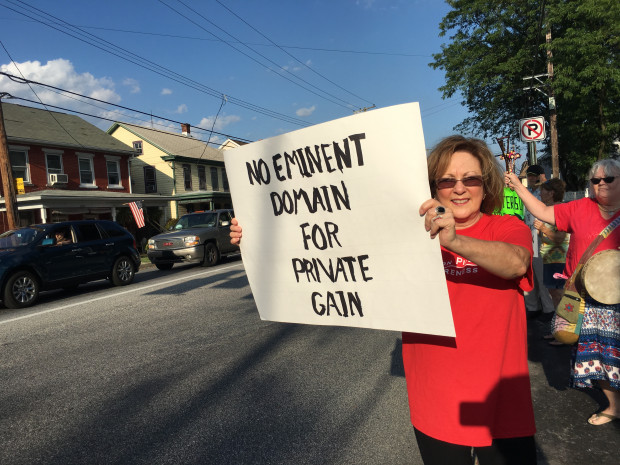A new front emerges in the battle against eminent domain

Marie Cusick/ StateImpact Pennsylvania
A pipeline protester in Lebanon County. Landowners and eminent domain attorneys see a new opening in the battle against eminent domain.
Eminent domain attorneys and their clients battling new pipelines in Pennsylvania courts feel they may have a new weapon in the fight against controversial projects like Sunoco’s Mariner East. The recent decision by the Pennsylvania Supreme Court to toss out industry-friendly provisions of the state’s oil and gas law included eminent domain for gas storage.
All across the state, private landowners have fought eminent domain takings for pipelines, arguing that the lines do not serve the public good. But they haven’t had much luck in convincing county judges, who have in all but just a few cases, ruled against landowners.
In September, a majority of the Supreme Court ruled that using eminent domain for underground gas storage violated both the federal and state constitutions. The court wrote that the public was not the “primary and paramount” beneficiary, as the state had claimed.
“Instead, it advances the proposition that allowing such takings would somehow advance the development of infrastructure of the Commonwealth. Such a projected benefit is speculative, and, in any event, would be merely an incidental one and not the primary purpose for allowing these takings,” wrote Justice Debra McCloskey Todd for the majority.
The decision was cheered by lawyers like Alex Bomstein, an attorney for the Clean Air Council challenging eminent domain takings by Sunoco Logistics for the Mariner East 2 pipeline. Mariner East 2 will carry natural gas liquids from western Pennsylvania to Delaware County where it will be shipped to Scotland to make plastics.
“Mere economic benefit is not enough,” said Bomstein. “Right now in Pennsylvania nobody is starving from lack of ethane. Nobody is crying in the streets for more butane. There is no apparent public need for these things and that’s demonstrated by the fact that [the gas products] are being exported.”
Sunoco Logistics would not comment on the Supreme Court’s decision for this story but the company says some of the fuel will be offloaded in Lebanon and Berks counties, thus serving the public good by addressing potential shortages and insuring an adequate supply of heating fuel for the winter months. Pipeline opponents say that’s a ruse used to convince the courts that the pipeline will serve a public good.
The Pennsylvania Public Utility Commission granted Sunoco a “certificate of convenience,” which designates it as a public utility and allows the company to argue for eminent domain. A spokesman for the PUC said the agency is “not in a position to speculate about the future impacts of the court’s decision,” regarding gas storage, and how that may play out regarding pipeline cases.
Although the legislature gave the PUC authority to designate pipeline companies public utilities, it did not grant them authority over where and how the pipelines are installed. Once a company receives a certificate of convenience, it’s essentially a blank check to develop its infrastructure, utilizing eminent domain to seize land if negotiations with landowners over compensation are unsuccessful. The Department of Environmental Protection has oversight when it comes to earth-moving and water-crossing permits, which is practically the only chance for the public to weigh in on how the project is implemented.
The PUC says its decisions regarding certificates of convenience are public and transparent. And it insists it has no role in how the courts decide issues of eminent domain. But Sunoco has argued, and the courts have ruled, that pipeline companies can take land through eminent domain based on decisions made by the PUC. The courts have used the certificates of convenience, issued by the PUC, as conclusive evidence for allowing the exercise of eminent domain.
This puts landowners in a difficult position when it comes to challenging the original PUC decision, which they must do within 30 days. For example, if, as in the case of Mariner East, the certificate of convenience was issued for Washington County, it would be difficult for a landowner 300 miles away in Delaware County to know that the PUC’s decision may result in a new pipeline coming through their backyard several years later.
Eminent domain attorney Rich Raiders, who represents a number of landowners who have cases with Sunoco, says his clients feel left in the dark on these decisions, and that the deck is stacked against them and in favor of pipeline operators.
“These guys are used to going to the PUC, and they go in and do what they want and nobody notices,” said Raiders. “And by the time the citizen knows it happened it’s already too late.”
The PUC says their decisions are made in public, broadcast online and are based on facts and laws. PUC spokesman Nils Hagen-Frederiksen says the commissioners and staff take their responsibilities toward the public seriously.
“As you well know, the Commission is an independent, neutral agency – tasked with ensuring safe and reliable utility service at reasonable rates, and balancing the needs of consumers and utilities,” Hagen-Frederiksen wrote in an email. “Anyone has the right to disagree with a Commission decision; that’s fair, and that’s part of the process – but there is absolutely no basis to attack the Commission’s impartial approach to any case, and those kinds of claims are unfair.”
In the meantime, Raiders has already used the Supreme Court’s decision regarding gas storage to file new briefs in some of his cases pending in common pleas courts across the state. He says the hot question for him and the landowners is whether the Supreme Court decision about gas storage could be applied to future decisions about natural gas pipelines.
“I don’t know, but they left a big fat opening for what exactly is public use and public benefit, he said. “Justice Todd raised a big red flag and that’s what they’re interested in hearing about.”
















